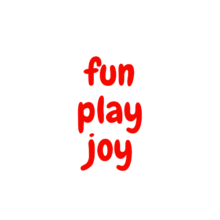the hygiene hustle
Playfully learn healthy hygiene habits
In the world of parenting, instilling good hygiene habits in children is not just about cleanliness; it’s about fostering lifelong practices that promote health and well-being.
However, convincing kids to wash their hands regularly or brush their teeth can often feel like an uphill battle.
The key? Make it fun! By incorporating playfulness into hygiene routines, you can turn mundane tasks into fun activities and make kids actually understand why hygiene is important.
But first, while there are many hygiene practices to consider, some stand out as particularly crucial for kids to master.
Let’s explore these essential hygiene habits and the benefits of children independently taking care of themselves.
Handwashing:
Handwashing is perhaps the single most important hygiene habit for kids to learn. Proper hand hygiene helps prevent the spread of germs, reducing the risk of illness and infection.
Teach your child to wash their hands with soap and water for at least 20 seconds, especially before eating, after using the bathroom, and after playing outside.
Encouraging independence in handwashing empowers children to take control of their health and well-being.
Toothbrushing:
Dental hygiene is another critical aspect of overall health.
Teach your child to brush their teeth at least twice a day, using fluoride toothpaste and a soft-bristled toothbrush.
Proper brushing removes food particles and plaque, preventing cavities and gum disease.
By mastering toothbrushing independently, children develop a sense of responsibility for their oral health, setting the stage for a lifetime of healthy smiles.
Bathing and showering:
Regular bathing or showering helps keep the body clean and fresh, preventing body odor and skin infections.
Teach your child how to bathe independently, including washing their body with soap and shampooing their hair. Encourage them to pay attention to areas that tend to get sweaty or dirty, such as underarms, feet, and groin.
Mastering bathing routines gives children a sense of autonomy and self-care, fostering confidence and independence.
Nail care:
Proper nail care is often overlooked but is essential for maintaining cleanliness and preventing the spread of germs. Teach your child to trim their nails regularly and keep them clean to reduce the risk of dirt and bacteria accumulating underneath. Emphasize the importance of not biting nails, which can introduce germs into the mouth and cause infections.
By mastering nail care independently, children learn the importance of grooming and personal hygiene.
Using tissues and cough etiquette:
Teaching children to cover their mouths and noses when coughing or sneezing helps prevent the spread of respiratory infections like colds and flu.
Encourage your child to use tissues or their elbow to cover their mouth and nose, then dispose of used tissues properly.
By independently practicing cough etiquette, children develop awareness of how their actions affect the health of those around them, fostering empathy and consideration for others.
Promotes independence:
Mastering hygiene habits empowers children to take control of their own health and well-being, fostering independence and self-confidence.
Builds responsibility:
Learning to independently care for themselves instills a sense of responsibility in children, teaching them to take ownership of their actions and choices.
Encourages healthy habits:
By practicing good hygiene independently, children develop lifelong habits that promote health and wellness, setting the foundation for a healthy lifestyle.
Fosters confidence:
Successfully mastering hygiene tasks boosts children’s self-esteem and confidence, as they see themselves capable of taking care of their own bodies.
Promotes personal growth:
The process of learning and mastering hygiene habits contributes to children’s personal growth and development, preparing them for the challenges of adulthood.
Now to the fun part!
Let’s explore some creative and playful ways to teach kids healthy hygiene habits:
Role-playing hygiene scenarios:
This is my personal favorite! Kids love to play pretend, so why not incorporate hygiene-themed role-playing into their imaginative play?
Set up a mini “doctor’s office” or “dentist’s office” where your child can play the role of the caregiver or patient. Use props like toy stethoscopes, bandages, or toothbrushes to act out scenarios involving handwashing, dental care, or first aid.
Take a doll into the bathtub and let them practice washing and rinsing the hair.
Not only does this make learning about hygiene more interactive, but it also helps reinforce important concepts through hands-on experience.
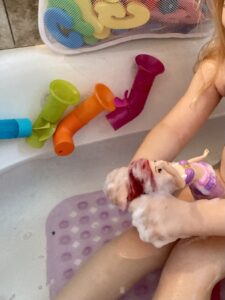
Use storytelling to reinforce hygiene messages:
Storytelling is a powerful tool for teaching lessons in a way that captures children’s attention and imagination.
Find age-appropriate books or create your own stories that feature characters practicing good hygiene habits. Use these stories as a springboard for discussions about why hygiene is important and how it helps keep us healthy and happy. Encourage your child to share their own ideas or experiences related to hygiene, fostering open communication and understanding.
Visualize why the habits are important:
A simple talk often doesn’t stick with kids for very long. They thrive on hands-on experiences, because it’s like learning with all senses engaged instead of just listening.
So for handwashing grab a white plate or casserole, draw the outline of your kid’s hand on it with a dry erase marker, fill the plate with water and sprinkle some glitter or black pepper on the surface. The glitter is going to be the germs in this little experiment.
Now let your kid touch the hand on the plate and look at their finger. They’ll have germs on it.
Next let your kid put their finger in dish soap before touching the plate and watch the germs run away as fast as they can.
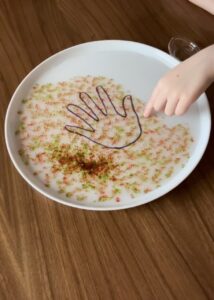
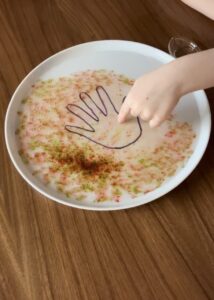
To practice toothbrushing, download my free printable.
Print it and cover the paper with contact paper or clear tape. Grab a dry erase marker, an old toothbrush and if you have a visual timer.
Now let your kid pretend they’re eating the biggest piece of chocolate and color those teeth with lots of dry erase marker.
When they’re satisfied with their work, set the timer and let them clean the teeth, while you can explain how to brush up and down and in little circles.
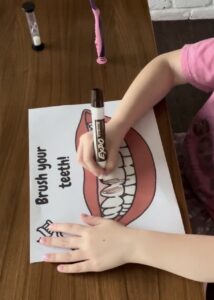
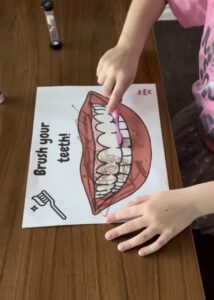
My daughter had so much fun with this activity.
Download it for free!
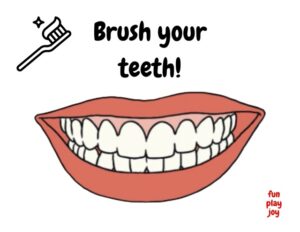
Turn handwashing into a song and dance:
Transform the act of handwashing into a fun and interactive experience with a catchy song or chant to accompany it. Encourage your child to sing or hum the tune while scrubbing their hands with soap and water. Create your own little song, sing the ABCs or use your little one’s favorite. You can even make up silly dance moves to go along with it. Not only does this make handwashing more entertaining, but it also ensures they spend enough time cleaning their hands thoroughly.
Turn bath time into a sensory adventure:
Bath time doesn’t have to be just about getting clean; it can also be a sensory experience.
Add some bath bombs or bubble bath to the water to create an enticing aroma and colorful display. Use pompoms or LEGOs to make it more fun. Provide bath toys like rubber ducks, squirt bottles, or foam letters to engage your child’s imagination and creativity. You can even play simple games like “I Spy” to make bath time more interactive and enjoyable.
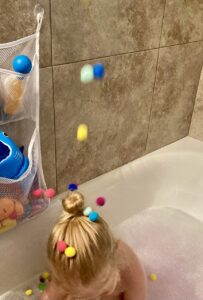
Make toothbrushing time a family affair:
Instead of viewing toothbrushing as a solitary task, turn it into a family event. Gather everyone in the bathroom and have a toothbrushing party! Play some upbeat music, set a timer (visual timers are always great for kids!), and see who can brush their teeth the longest or make the silliest faces in the mirror. By involving the whole family, you create a sense of camaraderie and make oral hygiene something to look forward to.
Create a hygiene chart with rewards:
Kids love incentives, so why not create a hygiene chart that tracks their daily habits? Use colorful stickers or markers to mark off each time they complete a hygiene task such as brushing their teeth, washing their hands, or taking a bath. Set achievable goals and offer rewards for reaching milestones, whether it’s a small treat, extra playtime, or a fun outing. This not only motivates kids to maintain good hygiene but also teaches them the importance of consistency and responsibility.
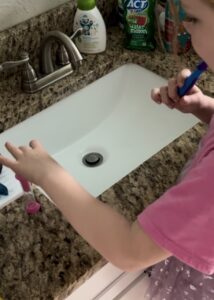
Incorporating playfulness into hygiene routines not only makes them more fun for your little one but also helps reinforce the importance of these habits in their daily lives.
By infusing creativity, imagination, and fun into activities like handwashing, toothbrushing, and bath time, you can set your kids on the path to a lifetime of good health and hygiene.
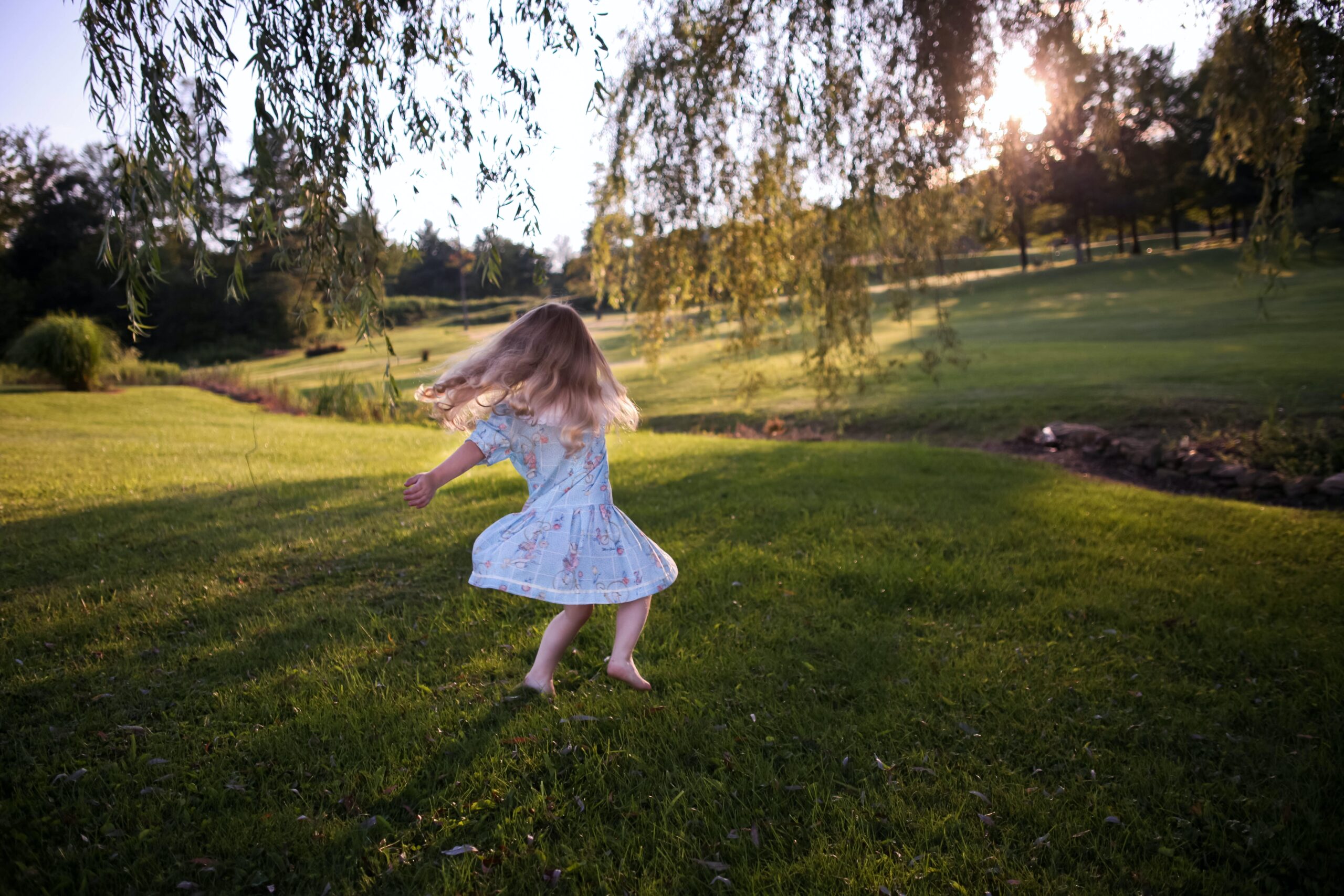
all about play
Playing is your kids most important job!
Learn why and see how we like to play in these posts.
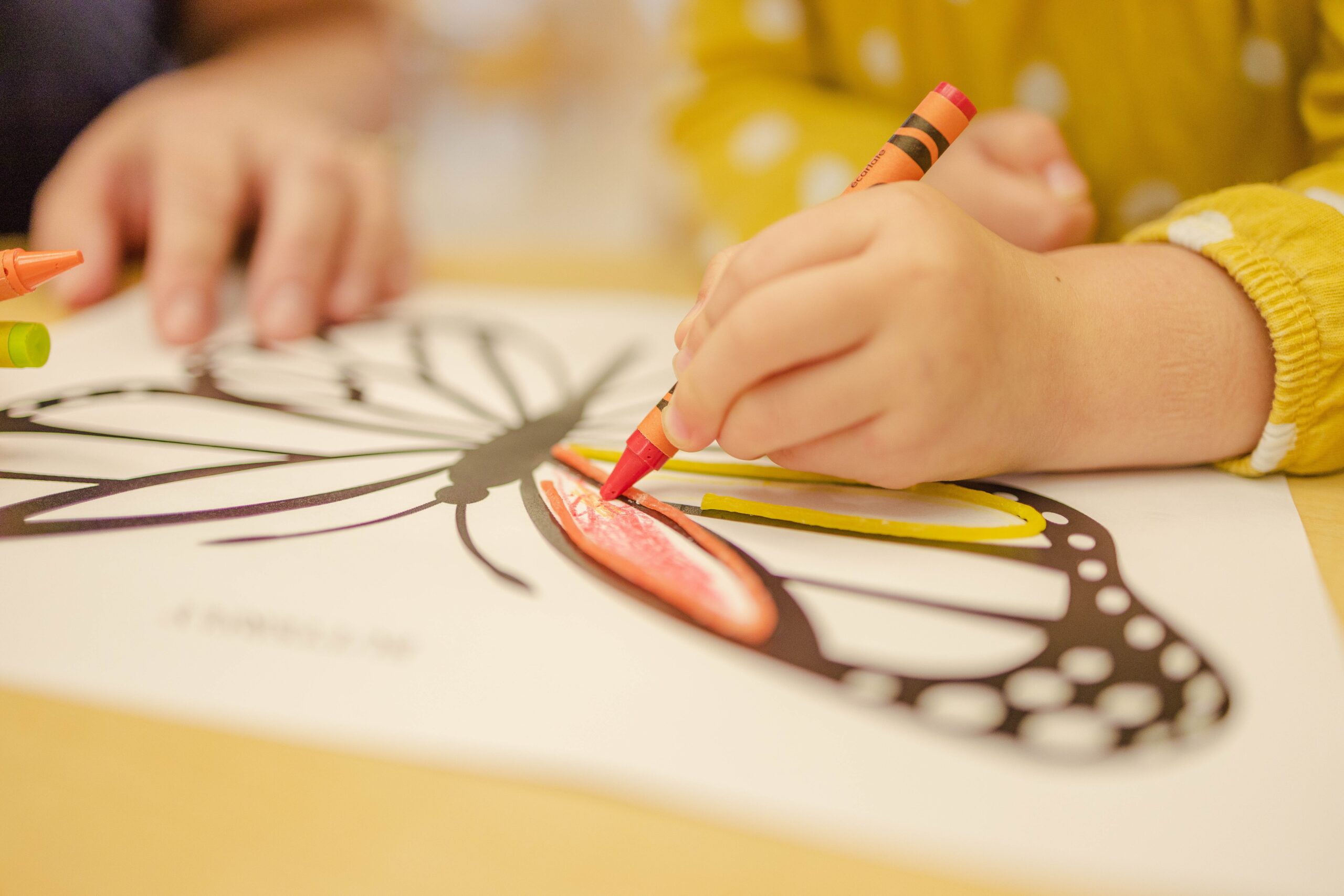
activities & inspiration
Let's get hands on!
Kids will love the crafts, games, sensory play ideas and more that you will find here.
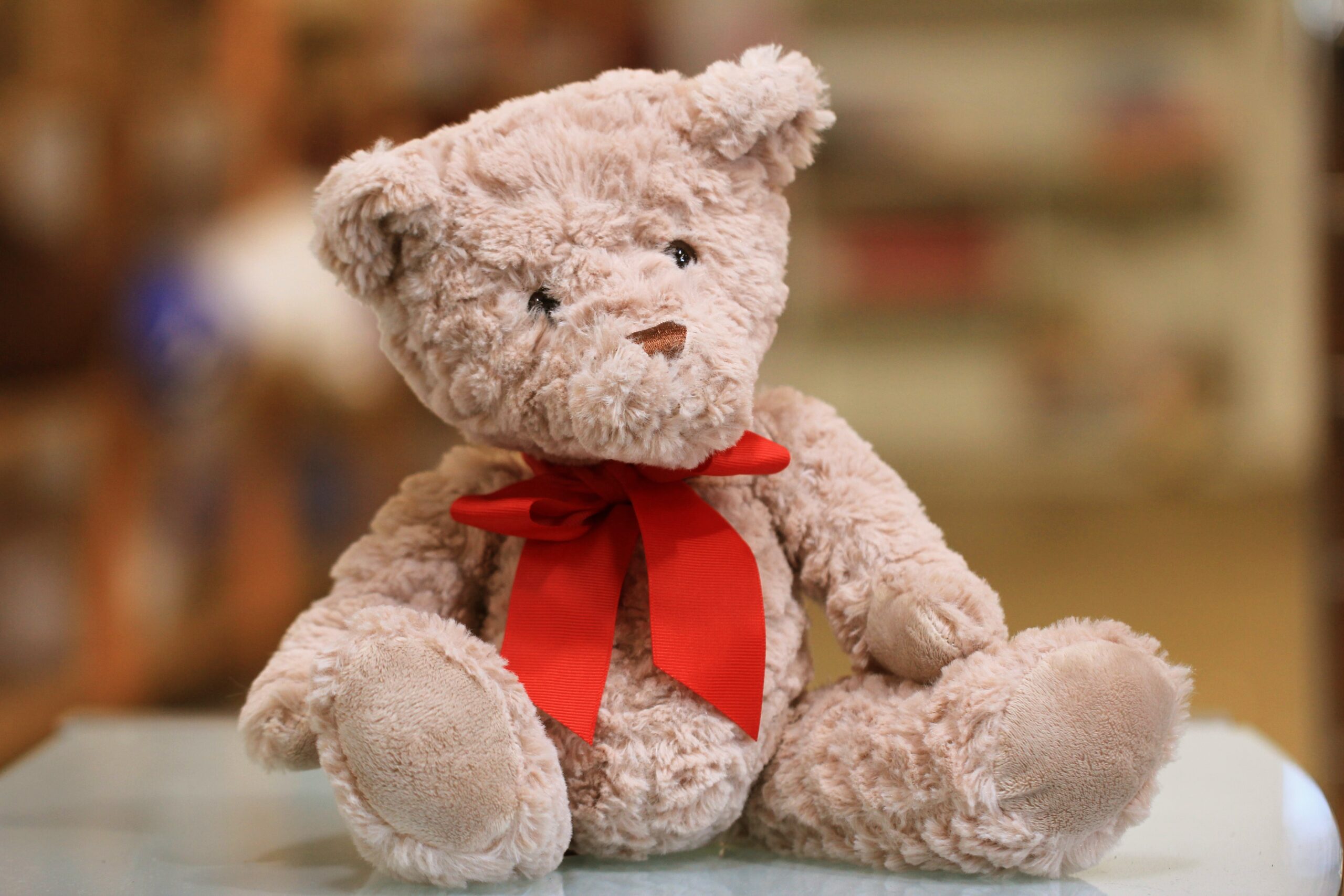
favorite toys
Toys are the tools to unlock your child's imagination!
Find out about our favorite toys and why we love them.
